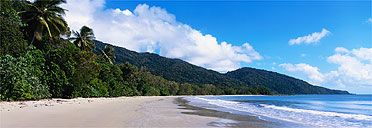
Humans move slowly in northern Queensland. The heat drains your energy. An hour after waking you feel as if you've done a full day's work when you've probably done no more than eat breakfast and head to the beach. Other forms of life, however, have more stamina.
In Queensland the rainforest meets the reef. Both are spectacular. The fish on the reef are easy to spot. They are brightly coloured and come in all shapes and sizes. There's the surgeonfish, the angelfish, the butterflyfish and the batfish. Also the boxfish, the clownfish, the squirrelfish and the goatfish. And the parrotfish, the rabbitfish, the rainbowfish and the combfish. My favourite names were the dogfaced pufferfish, the fire lionfish, the spangled emperor, the moorish idol and the chocolate dip fish. And that's naming just a few of the fish that can be found here.
At Reef Teach, Scott, a marine biologist, gave an energetic lecture about life on the reef. "There is absolutely no way you'll see a shark while you're out on the reef," he said. The audience gave a collective sigh of relief. "That's because they come up behind you."
Reef Teach estimates that 2% of people who go out to the reef attend one of their lectures. They teach tourists what they can touch, what they shouldn't touch and what will kill them if touched. There are other gems of information such as the sea cucumber that breathes through it's anus - although I didn't establish how they know that it doesn't just shit through its mouth.
Heinz was the instructor on my introductory dive. "The most important thing is to remember to breathe," said Heinz. This was above water of course. Below water, communication depends on signs. It was easy to mix up the sign for "I'm okay" with the sign for "I want to go up now". The former is an 'O' formed with thumb and forefinger with your other three fingers raised. The latter is a thumbs up signal.
We managed to get to the seabed. If I could have talked I would have run out of adjectives: the Great Barrier Reef is spectacular. However, as I was 10m under water, it was rather difficult to talk, which left the whole time to look and wonder.
On land the rainforest is no less spectacular. At Cape Tribulation it comes down to meet the ocean, with only strips of beautiful, white beaches separating the two. I took a guided night-hike through the rainforest. Armed with a torch, the guide pointed out insects and spiders. The torches picked out small, white glowing things. These, the guide told us, were spiders' eyes.
In Sydney I had been amazed when my companions happily left their bags, complete with house keys, wallets and mobile phones, on the beach while they went for a swim.
"Aren't you worried they'll get stolen?" I had asked. "This is Australia, not London," they replied. After a week I learned to adopt this easy-going attitude and left my belongings under a tree while I went for a dip in one of the netted-off areas at Cairn's northern beaches. The nets are to protect swimmers from fatal box jellyfish.
The souvenirs on sale in Cairns are not particularly classy. Purses made from the gutted bodies of cane toads compete for space with ones made from kangaroo scrotums. There are, of course, more traditional presents like boomerangs. At the Wundurra History Centre I learnt that there are two sorts of boomerangs: the returning boomerang and the non-returning boomerang. My boomerang failed to return. "That was supposed to be a returning one," I was told.
I thought it would be appropriate while in Australia to watch the Australian film, Rabbit Proof Fence. It is about the stolen generations of Aborigines removed from their families, a policy that continued until the 1970s. Nowadays high profile Aborigines, such as Olympic gold medallist Cathy Freeman and actress Deborah Mailman (who plays the loveable Kelly in the Australian drama The Secret Life of Us), are changing the ideas of the often racist Australian public.
The mattresses in some of Queensland's youth hostels were bought at auction after the Sydney Olympic games. They are the very mattresses that athletes slept on in the Olympic village. I rather hoped that I was sleeping on Cathy Freeman's. But I rather think that in the lazy tropical heat I was much more likely to be sleeping on the mattress of Equatorial Guinea's Eric Moussambani. He had never swum in an Olympic size pool before the games, and his record slow 100m freestyle won him his heat only because everyone else was disqualified.

